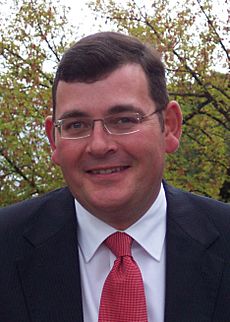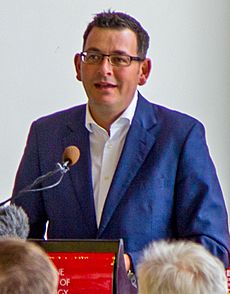Daniel Andrews facts for kids
Quick facts for kids
Daniel Andrews
|
|
|---|---|
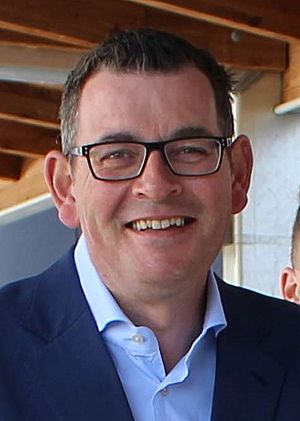
Andrews in 2018
|
|
| 48th Premier of Victoria | |
| In office 4 December 2014 – 27 September 2023 |
|
| Monarch | |
| Governor |
|
| Deputy |
|
| Preceded by | Denis Napthine |
| Succeeded by | Jacinta Allan |
| 17th Leader of the Labor Party in Victoria | |
| In office 3 December 2010 – 27 September 2023 |
|
| Deputy |
|
| Preceded by | John Brumby |
| Succeeded by | Jacinta Allan |
| Leader of the Opposition in Victoria | |
| In office 3 December 2010 – 4 December 2014 |
|
| Premier | |
| Deputy |
|
| Preceded by | Ted Baillieu |
| Succeeded by | Matthew Guy |
| Minister for Health | |
| In office 3 August 2007 – 2 December 2010 |
|
| Premier | John Brumby |
| Preceded by | Bronwyn Pike |
| Succeeded by | David Davis |
| Minister for Gaming | |
| In office 1 December 2006 – 3 August 2007 |
|
| Premier | Steve Bracks |
| Preceded by | John Pandazopoulos |
| Succeeded by | Tony Robinson |
| Minister for Consumer Affairs | |
| In office 1 December 2006 – 3 August 2007 |
|
| Premier | Steve Bracks |
| Preceded by | Marsha Thomson |
| Succeeded by | Tony Robinson |
| Member of the Legislative Assembly for Mulgrave | |
| In office 20 November 2002 – 27 September 2023 |
|
| Preceded by | District created |
| Succeeded by | Eden Foster |
| Personal details | |
| Born |
Daniel Michael Andrews
6 July 1972 Melbourne, Victoria, Australia |
| Political party | Labor |
| Spouse |
Catherine Kesik
(m. 1998) |
| Children | 3 |
| Alma mater | Monash University (BA) |
| Signature | |
Daniel Michael Andrews (born 6 July 1972) is a former Australian politician. He was the 48th premier of Victoria, serving from 2014 to 2023. The premier is the leader of the government in an Australian state.
Andrews was the leader of the Victorian branch of the Australian Labor Party (ALP) from 2010. He was also a member of the Victorian Legislative Assembly for the area of Mulgrave from 2002 until he left politics in 2023. He was the longest-serving Labor premier in Victoria's history.
Before becoming premier, Andrews was the Leader of the Opposition from 2010 to 2014. He led his party to victory in the 2014 election. He won again in the 2018 and 2022 elections.
During his time as premier, Andrews led Victoria through major events like the 2019–20 Australian bushfire season and the COVID-19 pandemic. His government was known for big building projects, like removing level crossings, and for making new laws on many social issues.
Contents
Early Life and Education
Daniel Andrews was born in Williamstown, a suburb of Melbourne. When he was a boy, his family moved to Wangaratta in northeastern Victoria. He went to Galen Catholic College.
In 1990, Andrews moved back to Melbourne to study at Monash University. He graduated in 1996 with a Bachelor of Arts degree in politics and classics.
After university, Andrews started working in politics. He worked for a federal Labor politician named Alan Griffin. From 1999 to 2002, he worked for the Labor Party, first as an organiser and then as an assistant state secretary.
Start of His Political Career
Working in Government (2002–2010)
In 2002, Andrews was elected to the Victorian Legislative Assembly to represent the area of Mulgrave. He was given a role as Parliamentary Secretary for Health.
After the 2006 election, he became a minister in the government. His jobs included being the Minister for Gaming and Minister for Consumer Affairs. In 2007, he became the Minister for Health.
Leader of the Opposition (2010–2014)
The Labor party lost the 2010 election. The party's leader, John Brumby, resigned. On 3 December 2010, Daniel Andrews was chosen as the new leader of the Labor Party in Victoria.
This made him the Leader of the Opposition. The opposition is the main party that is not in government. Its job is to question the government's decisions and suggest different ideas. Andrews held this role for four years.
Premier of Victoria (2014–2023)
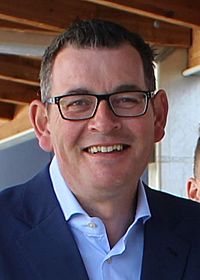 |
|
|
Premiership of Daniel Andrews
|
|
|---|---|
| 4 December 2014 – 27 September 2023 | |
| Premier | Daniel Andrews |
| Governor | Alex Chernov Linda Dessau Margaret Gardner |
| Cabinet | Andrews I Andrews II Andrews III |
| Party | Victorian Labor |
| Election | 2014 · 2018 · 2022 |
| Appointer | Governor Alex Chernov |
| Seat | 1 Treasury Place |
|
← Denis Napthine • Jacinta Allan →
|
|
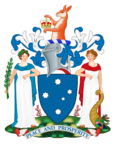 |
|
| Coat of arms of Victoria | |
In the 2014 state election, the Labor Party won enough seats to form a government. Daniel Andrews became the premier of Victoria on 4 December 2014.
First Term as Premier (2014–2018)
When he became premier, Andrews' government started several large projects. These included the Level Crossing Removal Project to get rid of dangerous railway crossings and the Melbourne Metro Rail Project to build new train tunnels under the city.
In 2016, his government sold the right to run the Port of Melbourne for 50 years. This deal earned the state more than $9.7 billion.
In 2017, his government passed a law about voluntary assisted dying. This law gives people with terminal illnesses more choices at the end of their life. Victoria was the first state in Australia to pass such a law.
In 2018, Andrews announced a huge new project called the Suburban Rail Loop. This project aims to connect all of Melbourne's major train lines in a large loop.
Second Term as Premier (2018–2022)
At the 2018 election, the Labor party won a very large victory. They won many more seats, which showed that many Victorians supported their work.
During his second term, Andrews led the state through the 2019–20 bushfires and the COVID-19 pandemic.
The COVID-19 Pandemic
The COVID-19 pandemic was a major challenge. In 2020, Victoria had a large increase in cases. To stop the virus from spreading, the government brought in strict rules called lockdowns.
For a time, people in Melbourne had to stay home except for essential reasons. There was a curfew at night, and people had to wear masks. These rules were tough, but they helped to lower the number of cases.
Andrews held press conferences almost every day to explain the situation. Many people watched these, and his leadership was both praised and criticised.
Third Term and Resignation (2022–2023)
Andrews led Labor to another victory in the 2022 election. He promised to continue big projects like the Suburban Rail Loop and to make kindergarten free for families.
In July 2023, Andrews announced that Victoria would no longer host the 2026 Commonwealth Games. He said the cost had become too high.
On 26 September 2023, Andrews announced he was resigning as premier and as a member of parliament. He said it was time for him to step away from the job. His deputy, Jacinta Allan, became the new premier.
Andrews is one of the few Australian politicians who never spent any time as a "backbencher" (a member of parliament without a leadership role). He was always a minister, opposition leader, or premier.
Personal Life
Andrews married Catherine Kesik in 1998. They have three children and live in Mulgrave, the area he represented in parliament. He is a supporter of the Essendon Football Club in the AFL.
In March 2021, Andrews had a serious accident when he fell on wet stairs. He broke several ribs and a bone in his back. He had to take time off work to recover, and the Deputy Premier, James Merlino, was the Acting Premier until he returned in June 2021.
Honours
In 2024, Andrews was awarded the Companion of the Order of Australia. This is one of Australia's highest honours. He received it for his service to the people and Parliament of Victoria, especially in public health and building new infrastructure.
 | Calvin Brent |
 | Walter T. Bailey |
 | Martha Cassell Thompson |
 | Alberta Jeannette Cassell |


